Election 2024 Watch: Week 5
My “Personal Politics” and the Democratic National Convention, Part One.
1. Let’s hear it for the boomer feminists!
Everyone knows the famous line—“the personal is the political”—although most people attribute it incorrectly to Gloria Steinem. It was actually the inspiration of less-mainstream feminist Carol Hanisch, who was also the organizer of the “No More Miss America” protest of September 7, 1968.
Yes, 1968 was notable for more than the assassinations of Bobby Kennedy and Martin Luther King and the chaos and violence of the Chicago DNC. Several journalists wrote about that event as the 2024 DNC approached, dissected 1968 as either a cautionary tale or a historically distinct episode that would not be repeated. They had their eyes on the largely male police and protestors who had been setting the dominant ideological tone and tactics of the free speech, anti-war and other movements. Women participated in those movements, but pushed to the sidelines, had also been discovering and developing our own.
“Women’s Liberation” (or “the Second Wave,” as it’s sometimes called) has gotten a bad rap—both in those early days and by later generations. In the 60’s and 70’s we were caricatured as ugly, humorless prudes who hated men so much we wouldn’t stoop to shave our legs for them. Later on, feminists of the “third wave” and beyond took us to task (and stopped assigning us in their classes) for being heterocentric and biased toward “white women’s issues,” and a bit later, insufficiently “transnational.”
In many other writings, I’ve examined both the regions of validity and the inadequacies of these criticisms, and I’m not going to repeat them here.
Here, I only want you to think about that Miss America Protest (for many of you, rethink it, for others think about it for the first time, for others remember) as a very different template and origin-touchstone for the 2024 DNC than the violence-wracked DNC of 1968. It was, to begin with far from the unidimensional protest against only those issues typically then construed as “white women’s” issues. Instead, “Miss America” was deconstructed as both symbol and practice of a whole catalogue of America’s ills, including racism, consumerism, and the “military industrial complex.” For another, although participants were pissed off, they were playful, theatrical, excited—and yes, joyful—about coming together as agents of change. They put on a show.
Here’s how Roxane Gay wrote about it in 2018:
The organizers issued a document offering ten reasons why they were protesting, with detailed explanations—a womanifesto, if you will. One contention was “the degrading Mindless-Boob-Girlie Symbol.” Another was racism, since a woman of color had never won—and there had never been a black contestant. “Nor has there ever been a true Miss America—an American Indian,” they wrote. They also protested the military-industrial complex and the role of Miss America as a “death mascot” in entertaining the troops. They pointed to the consumeristic nature of corporate sponsorship of the pageant and the valuing of beauty as a measure of a woman’s worth. They lamented that with the crowning of every new Miss America, the previous winner was forced into pop culture obsolescence. They rejected the double standard that contestants were forced to be “both sexy and wholesome, delicate but able to cope, demure yet titillatingly bitchy.” The pageant represented the elevation of mediocrity—American women were encouraged to be “unoffensive, bland, apolitical”—and instilled this impoverished ambition in young girls…
The protesters adopted guerrilla theater tactics, too. One woman performed a skit, holding her child and pots and pans, mopping the boardwalk to exemplify how a woman’s work is never done. A prominent black feminist activist and lawyer, Florynce Kennedy, who went by Flo, chained herself to a puppet of Miss America “to highlight the ways women were enslaved by beauty standards.” Robin Morgan, also a protest organizer, later quoted Kennedy as comparing that summer’s violent protests at the Democratic National Convention to throwing a brick through a window. “The Atlantic City action,” Kennedy continued, “is comparable to peeing on an expensive rug at a polite cocktail party. The Man never expects the second kind of protest, and very often that’s the one that really gets him uptight.”
Uptight, for sure. Male journalists seethed and condescended and insulted and misreported. And although no bras were actually burned (there was a “freedom trash can” into which bras, girdles, and other items were thrown, but not incinerated) they branded us as “bra burners.” Art Buchwald wrote:
“The final and most tragic part of the protest took place when several of the women publicly burned their brassieres. If the average American female gave up all her beauty products she would look like Tiny Tim and there would be no reason for the American male to have anything to do with her at all.”
When I taught courses on the 60‘S and on the history of feminism, my students, both male and female, had a hilarious time while re-enacting history and sharing their own stories by bringing in any and all items of their own gender, race, or sexual oppression and filling the can that we’d lugged from the hall.
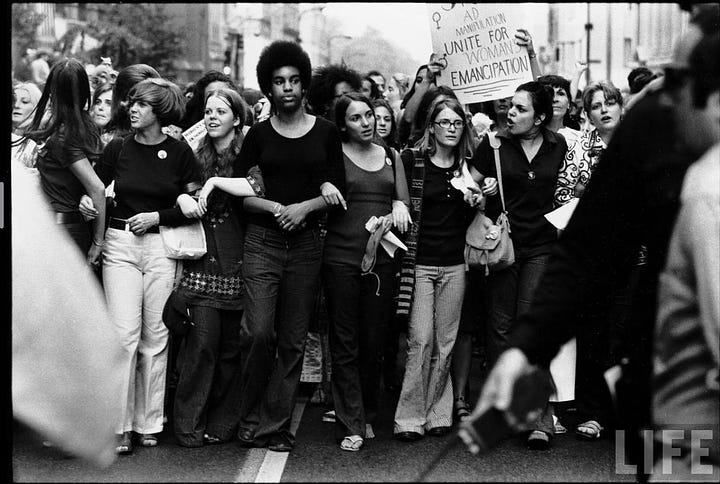
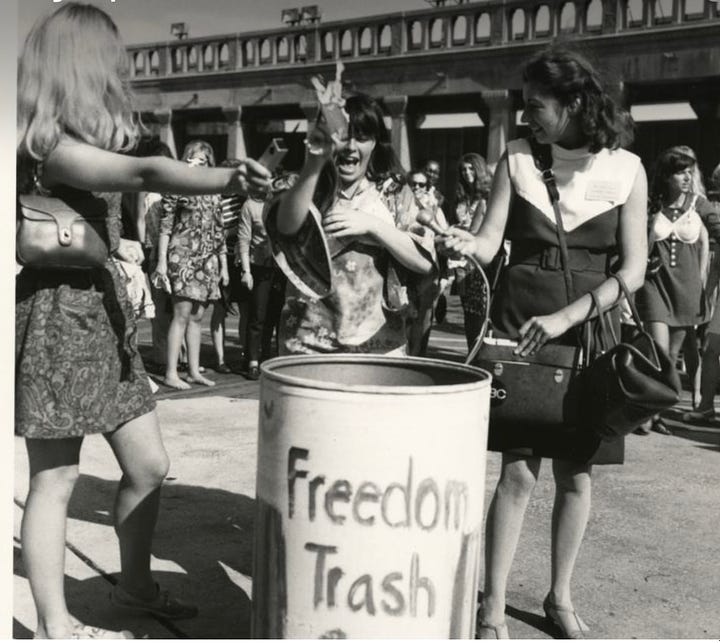
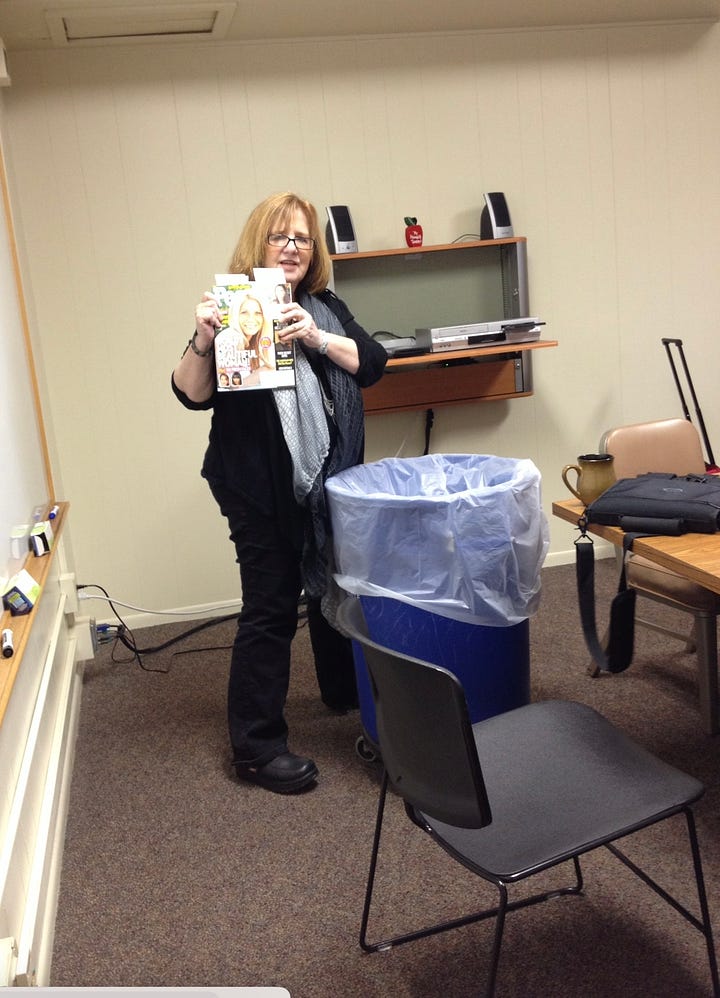
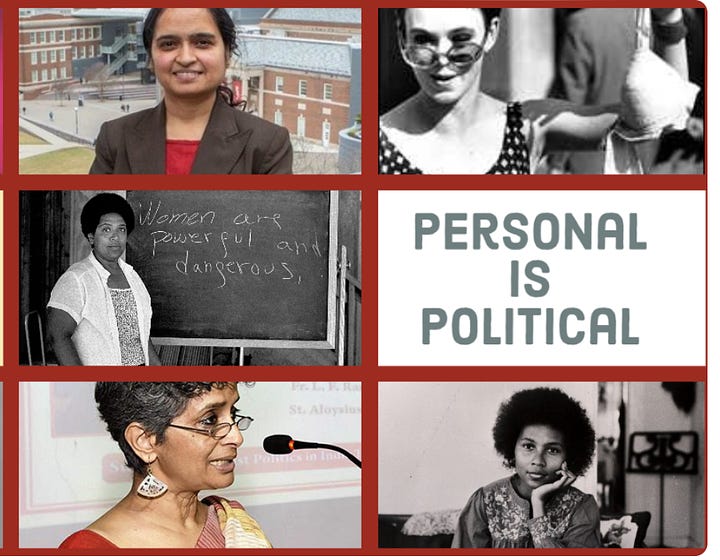
Yes, that’s me over in the lower left corner, holding up a “woman’s” magazine.
What got me thinking about all this was both Kamala Harris’ and Barack Obama’s mothers—one East-Indian and the other white—who had been activists of roughly my generation, the frequent mentions of Shirley Chisholm at the DNC and a segment on Joy Reid, in which she interviewed the women—Minyon Moore, Donna Brazile, Leah Daughtry, Tina Flournoy, and Yolanda Caraway—who spearhead Jesse Jackson’s campaign and have been Democratic political advisors—most recently to President Biden—ever since.
Click!! Both Kamala Harris and Barack Obama—and indeed, many of the even younger activists who brought such diversity and joy to the 2024 DNC—were raised by MY generation! The very same generation of (roughly) 70-90 year-old feminists, writers and political activists that (along with “boomers” in general) have been criticized and lampooned every which way (and whose ground-breaking writing, with some exceptions, has been largely shoved off the curriculum as retrograde and outmoded.)
Who do you think this guy learned it from?
The DNC didn’t credit our movement, just selected individual feminists, so I’m correcting that here. Let’s hear it for Women’s Liberation!!
2. Tim and Gus and Cassie
Occasionally, I put up a note that strikes home to more people than I’d expected. This was one of them:
I wanted in this post to celebrate Gus and Tim and to subtly turn the concept of “difficulty regulating emotions,” which you’ll find in many descriptions of various forms of neurodiversity, on its head. As many people have picked up on since the “Gus moment” at the DNC, “disregulation of emotions” is not only a negative way of describing unabashed exuberance and expression of love, but it’s kind of masculinist too, isn’t it? Who, from the Greeks on down, has been disdained and imagined to be unequipped for positions of authority but us “too emotional” women? It’s been conceptualized and theorized by philosophers, psychologists, ideologues and theologians throughout history. We’re ruled by our emotions, and so not fit to rule a nation.
Both Kamala Harris and Tim Walz have demonstrated what bullshit that is. And in fact, the entire convention was one big, collective explosion of emotion.
But gender associations aside, the “Gus moment” spoke in a special way to the parents of neuro-atypical children.
“For us to see … Gus being able to really share his authentic self without worrying. There’s no worrying about what’s going on behind him, who’s maybe judging him … there isn’t any of that. It’s really refreshing,” said Donovan, a clinical psychologist who works with neurodivergent people.
The Walz family told People magazine earlier this summer that Gus has nonverbal learning disorder, which means he processes visual and spatial information differently, as well as ADHD and an anxiety disorder.
“Like so many American families, it took us time to figure out how to make sure we did everything we could to make sure Gus would be set up for success as he was growing up,” they told People.
“What became so immediately clear to us was that Gus’ condition is not a setback — it’s his secret power,” they said.
Some parents noted how on that stage, Gus’ family didn’t try to tamp down his display of emotions. He was able to be himself without holding back, something Donovan strives for with James and the neurodivergent people she works with.
“I often have clients who say they can’t be their authentic self in different environments,” she said. “They have to pick and choose, so to speak, which environments are safe to be their authentic selves and in which environments they have to ‘mask.’”
So much of the piece I’ve just quoted spoke to me as the parent of a daughter whose combination of neurodivergent qualities—Cassie is ADHD and has social anxiety—is different from Gus’s, but who was misunderstood, judged, and punished for her “authentic self” throughout much of her preteen and early teen years. She started out as a wonderful reader, but largely uninterested in anything they were reading about. And when she was uninterested, she couldn’t perform on demand—which then got interpreted as belligerence. Feeling more at home with the boys (who didn’t require chit-chat from her) than the better-disciplined girls, she got “into trouble” with them, and got punished not just for the behavior, but for not being enough of a girl. Because she was such a facile reader, she initially got assigned to help other students with reading difficulty—and enjoyed it enormously. But it had a huge impact on her when her teacher interpreted an object falling from her backpack as Cassie “throwing it down” purposely (seen as an “angry Black woman” even when she was a little girl) and took her privileges as reading tutor away. It didn’t take long before she wasn’t reading at all.
Although I was perfectly fine with Cassie being gender “non-normative,” the fact that she lost interest in reading concerned me. That’s a way of putting it that’s too kind to me—I was really, really upset that even though she was an excellent reader, she hated reading. My bad, my bias—it’s not necessary to be a reader in order to have a perfectly fulfilling life. And I didn’t understand, too, that sheer ability didn’t necessarily translate to “can do it.” In fact, Cassie couldn’t stay focused on words and didn’t even want to try, not because she literally couldn’t read, but because they didn’t hold her attention. I had been a child that might have been in a permanent state of depression if it wasn’t for the local library, so it was hard for me to “get” how different it was for her—and apparently, hard for most of her teachers to get it too.
My older sister, a therapist who worked a lot with children, suggested I have her tested for ADHD. So I did, and was told she tested “too smart” for that diagnosis. He was an idiot.
By the time she was properly diagnosed, she hated most teachers, hated school, and eventually was expelled from high school for two mild outbursts of anger and (three strikes you’re out at that school) when they found a substantial amount of alcohol and weed in her car. Some of it was Cassie’s, but most of it belonged to her friends, who didn’t want it in their rooms. Cassie can’t say no to friends, and she wouldn’t let me name names. She’s the most loyal person I know. Didn’t matter to the Dean. (I‘ll leave you to imagine what her hot-headed mother said to him.)
But Cassie’s story doesn’t end there. For she, like Gus, has super-powers. There’s her loyalty and generosity. Her incredible ability to “take in” the world around her—she literally notices everything, and while that can overwhelm and flood her in certain contexts, it’s a huge benefit in others. She escapes to her room if she thinks Edward and I are angry with each other, but she’ll never miss a stop sign, a squirrel running in front of the car, or a person on the side of the road, asking for some help. She still hates reading. But like many people with ADHD, while she has trouble focusing on some things, she can hyper-focus on others. If the words are on a set of instructions? She’s a genius. If you want to figure out how something works? Put together a bird cage or a piece of IKEA furniture? Thank goodness Cassie is in the house.
But most magical of her super-powers is her genius with animals, particularly horses, who she’s loved, tended, and ridden since she was four and now cares for on a thoroughbred farm. And here’s the thing: The more “difficult” the horse, the more she is drawn to them. She understands—deeply understands—that what gets seen by some as willfully disobedient is just the struggling nature of a special, wild being in need of being understood and loved for exactly who they are.
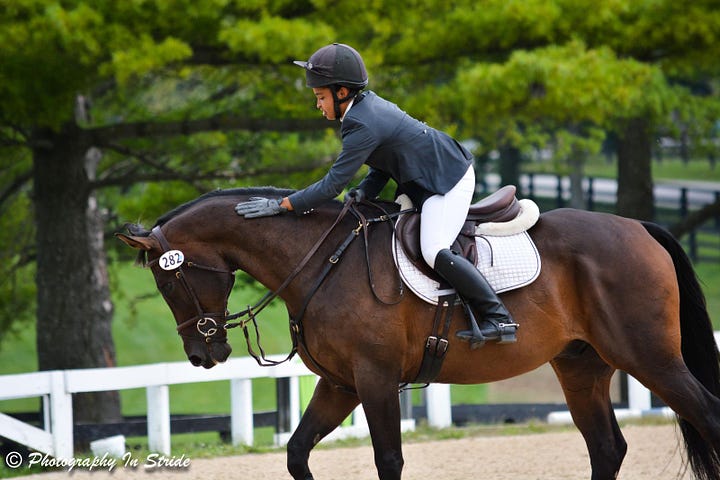
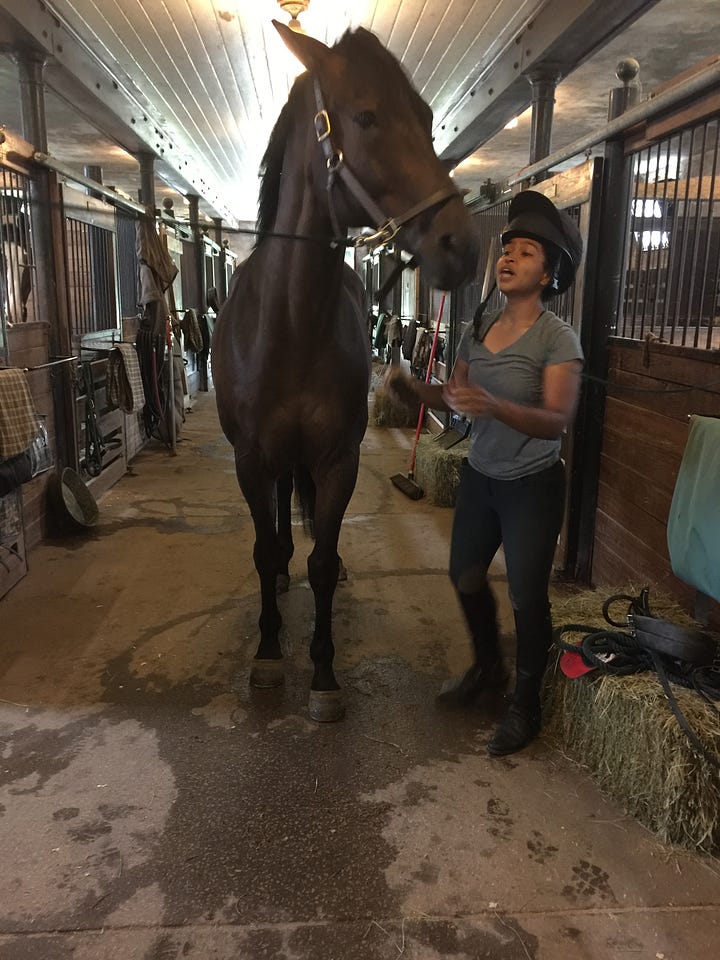
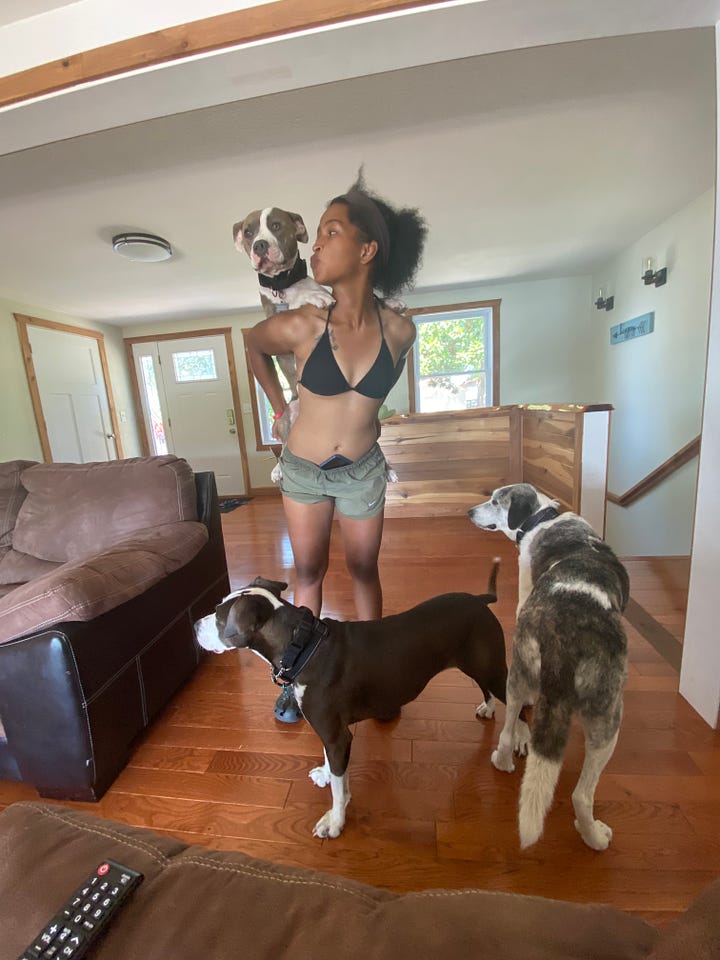
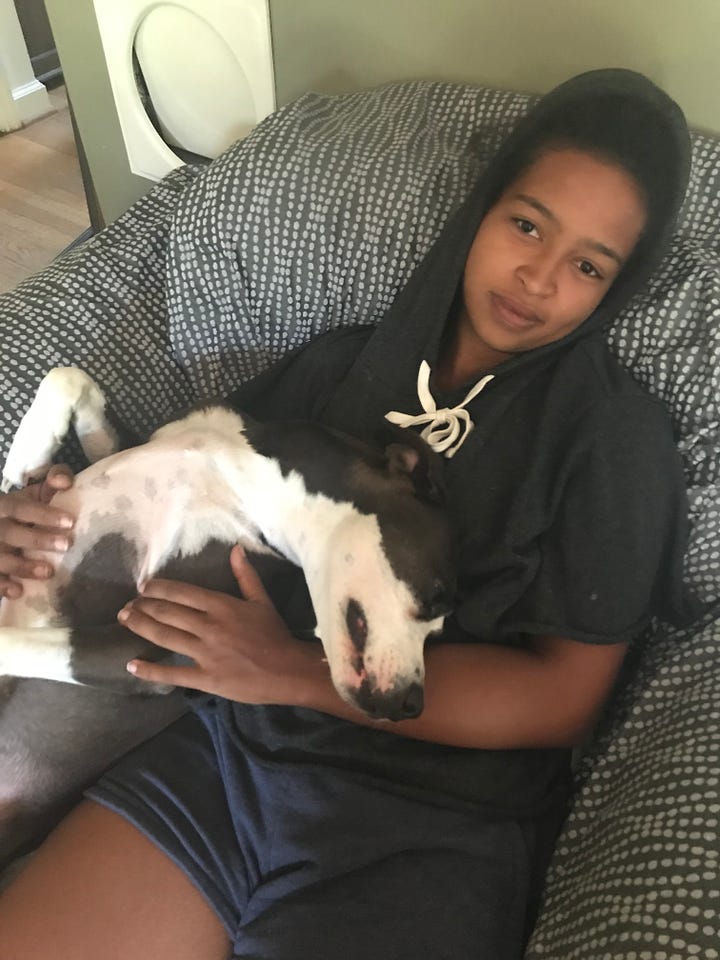
3. My favorite line from Kamala Harris’ speech. And you have to listen to it too, as her delivery was EVERYTHING.
Part two of my “personal politics” and the DNC coming later this week. If you enjoyed this one and aren’t yet subscribed, please consider subscribing! You can do it for free or for $30 year. I’m donating most of what I earn to support reproductive choice and access. And every paid subscription also gives me a little boost of encouragement to keep going. But whether for free or paid, you’ll get everything I write and can participate in every conversation. And we’ve had some great ones!!

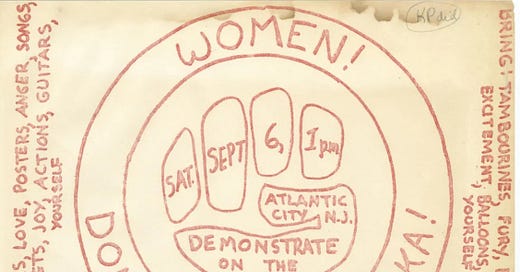



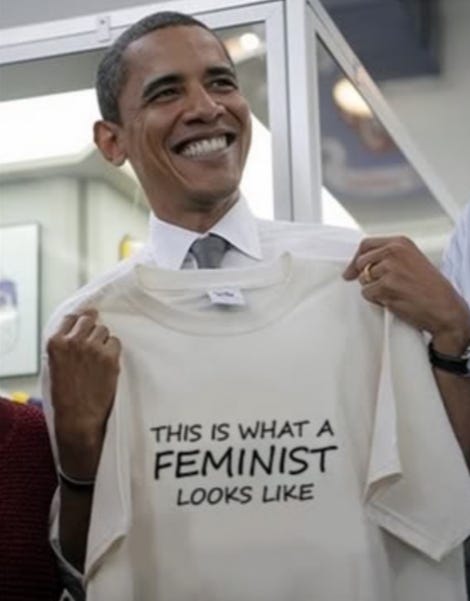
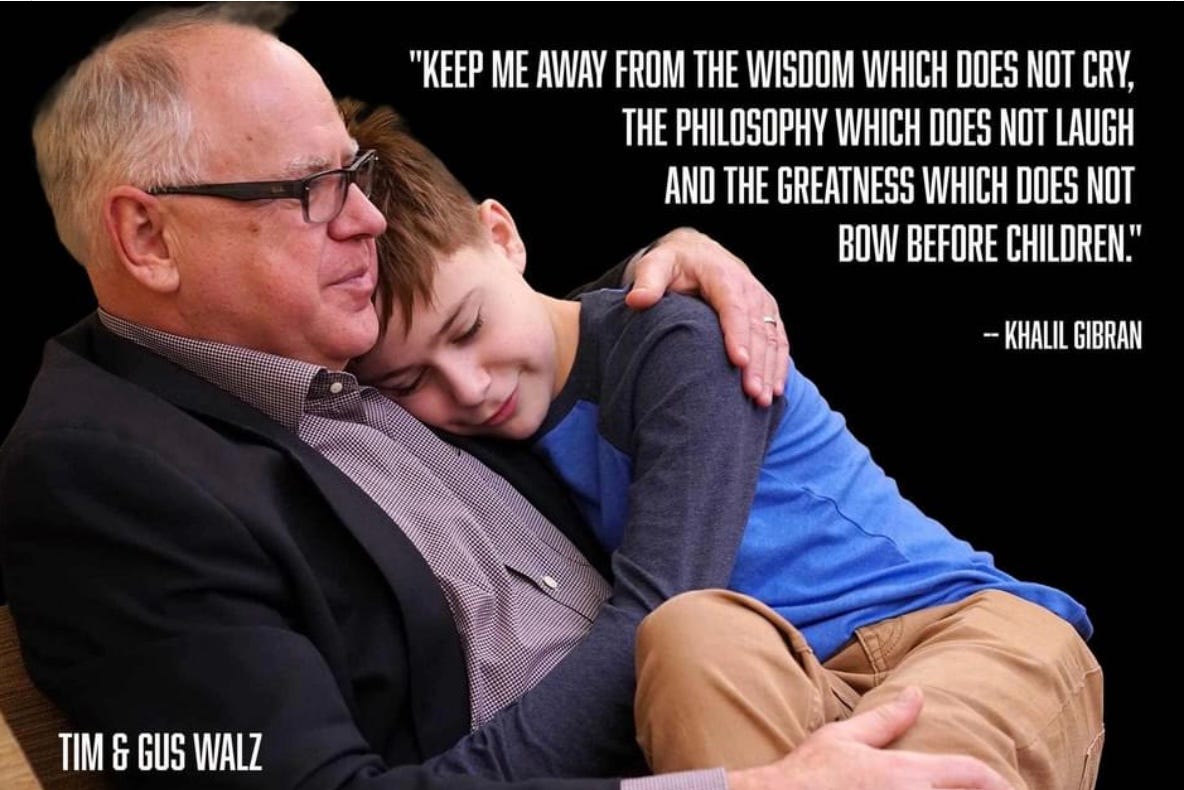
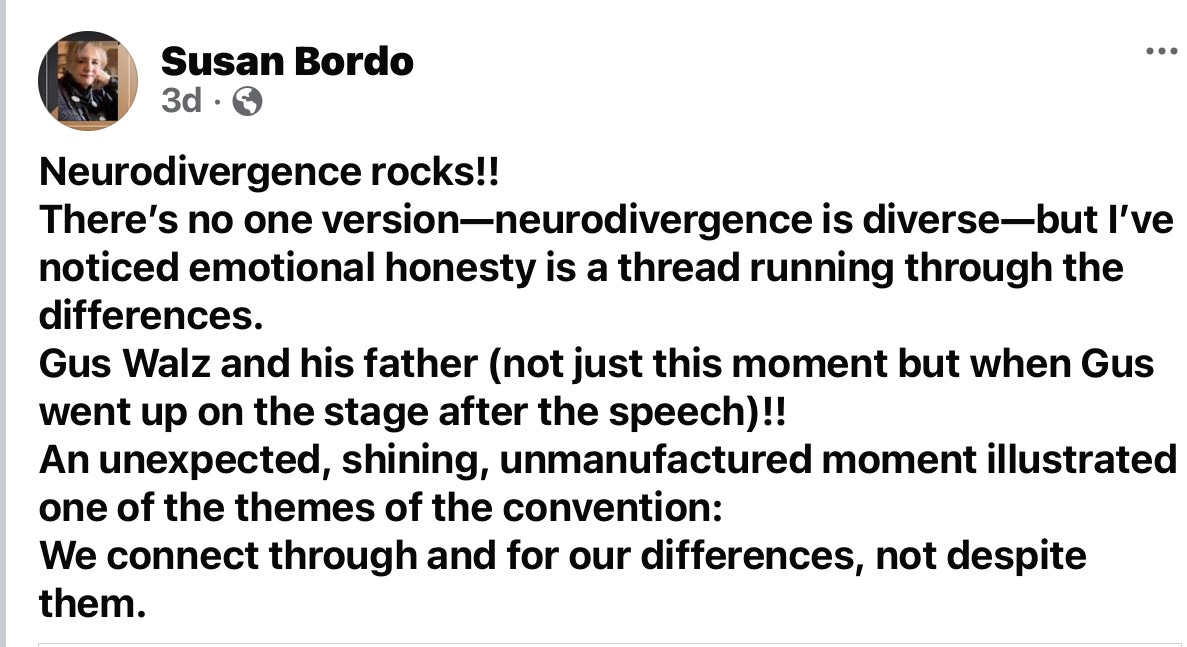
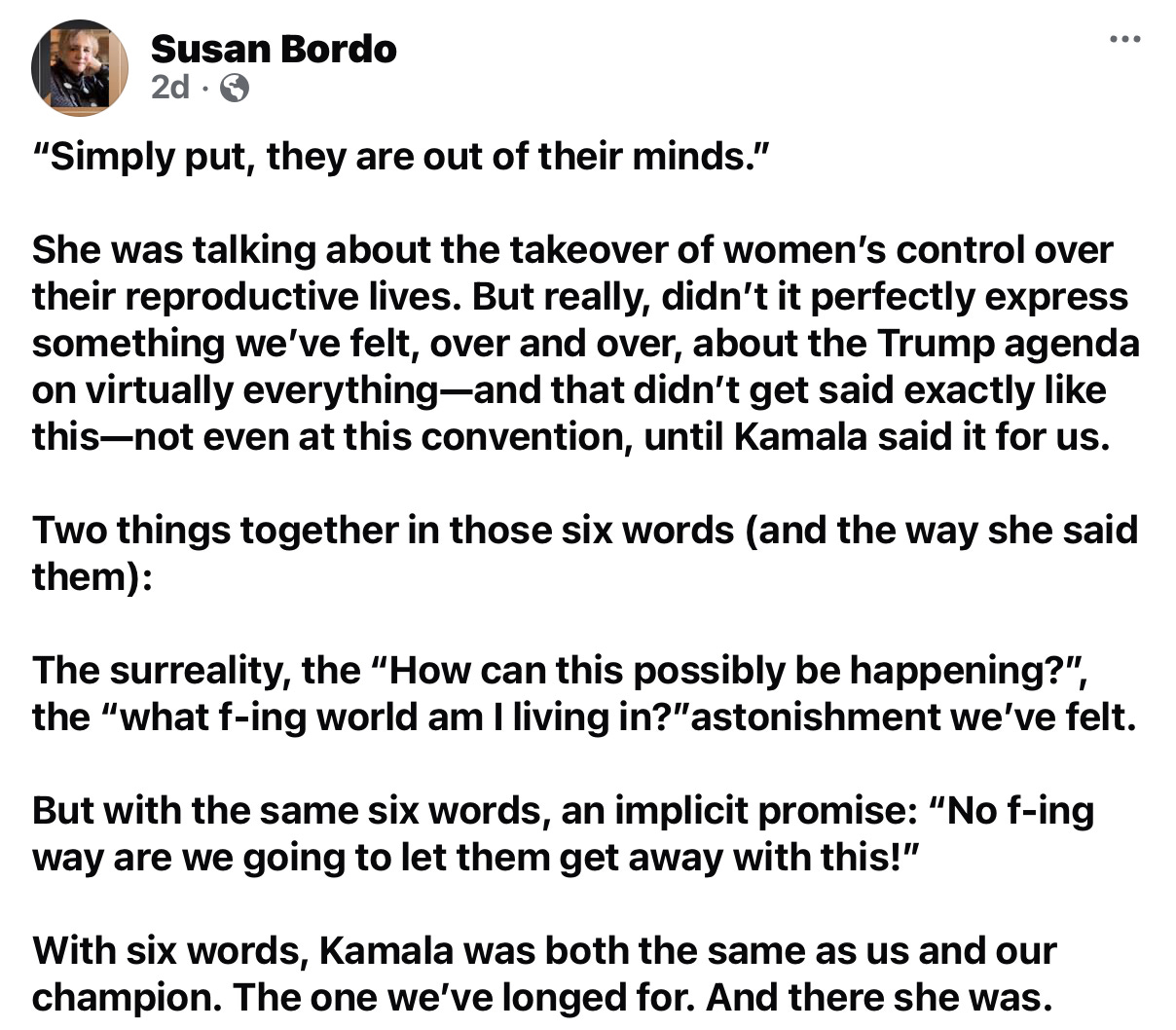
I am a Boomer feminist and proud of my participation in the Second Wave. Thank you for remembering us all.
I guess I would be of the age of being a second wave feminist- sort of. Well actually my parents were. My father who was the only member of his family to go to college and my mother who was brought up hearing how girls dont go to college they get married and have babies, made sure that they educated all 3 of their daughters.
The interesting thing about beauty pageants is that we actually enjoyed them growing up. It wasn't until my sons actually objected to watching them did we stop. "if girls are my equal," my oldest said, "I am not going to watch something that objectifies them." I don't know if he heard that in school or he figured it out on his own, but kudos to him for being able to process everything in that statement as a middle schooler. (Those were his words. I have mentioned that I have a very weird kind of memory)
I loved Gus showing such wonderful emotions. I remember as a child watching the nomination of Jimmy Carter and they panned to women delegates crying on the convention floor. And I asked my mother why they were crying and she said that they were just overwhelmed.
Well if grown ass women can cry when a total stranger is nominated to POTUS why wouldn't a son be so proud of his dad when he is nominated as VP. I have to say I object though to people saying that the reason Gus cried was that he is emotionally dysregulated because of his NVLD and ADHD. I think it was a moment of sheer unadulterated exaltation.
Isn't it interested that the political party that derides single cat ladies have no understanding of how proud a child could actually be of their parent. Just a thought.
BTW I think your daughter is beautiful (am I allowed to say that?) and you are wonderful parents allowing her to find her way and supporting her the way she needs. :)